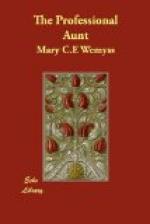In answer to a really desperate telegram from Zerlina, I left Hames hurriedly, and arrived at Zerlina’s, to find her out and all the children apparently well. I was shown upstairs into the drawing-room. In Diana’s house I am never “shown” anywhere; however, in Zerlina’s I am, so it is no use discussing that question. The drawing-room into which I was shown was empty of furniture except for the sofas and chairs which were arranged round the room against the wall. As Zerlina’s room does not err as a rule on the side of emptiness, I realized that there was going to be a party. I felt like the child who said, “There’s been a wedding, I smell rice!” One knows these things by instinct.
The butler solemnly informed me that there was going to be a party, and that Miss Hyacinth would be down in a moment.
I thought it odd that Zerlina should have said nothing about a party; but then she never says anything about measles, or whooping-cough, or re-painting rooms, until I am within the doors and unable to escape. I remembered she had urged me on this occasion to come early. I sat down on a sofa and sadly fixed my gaze on the parquet floor. How different had been my arrival at Hames! My conscience smote me. I had no train, no cooking stove,, no woolly rabbit in my box. But then neither was there a Hugh, Betty, and Sara. At Hames should I have sat in the drawing-room? Never! Of course I know what some people will say: that it is my fault; if I had treated the children as I treated Betty, Hugh, and Sara, it would have made all the difference; but it wouldn’t, really. It is, the mother of the children who makes the difference; it is her attitude to the aunt which is adopted by the children. If Diana had been out, the house would have resounded with shrieks for Aunt Woggles. But in Zerlina’s house children never shriek, people never rush to the nursery. The children are always tidied before they are brought down to see me.
Of course some people will again say, “Quite right”; and it is quite right that for such people they should be tidied; but do those people realize what a wall tidiness builds between child and grown-up? Have they ever thought what a boy feels when his mother comes down to see him at school and the first thing she does when he comes into the room is to say that his collar is dirty, or that his hands want washing? At that moment, perhaps, she lays the first brick in the wall which builds between mother and son. He is a happy boy and she a blessed mother who stand always with no wall between them. All a boy demands of his mother when she comes to see him at school is that she shall behave just like other people, and that she shall dress properly. If she can be beautiful, so much the better: it will redound enormously to his credit. Boys are very sensitive about their belongings, but when praise can be bestowed they bestow it, as in the case of Tommy, who wrote to his father, who had been down to the school to play in a match, “Fathers against Sons, “Dear father, you did look odd, but you made the second biggest score.”




